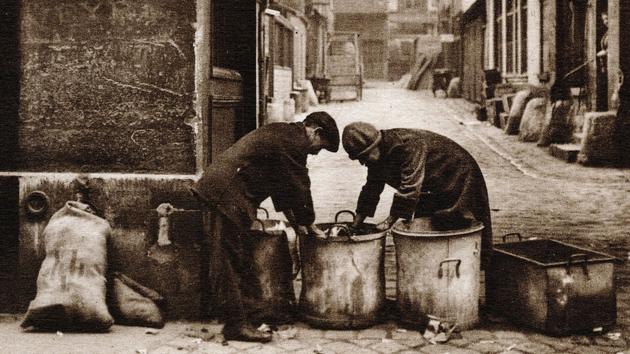In partnership with
RetroNews
, the BnF press site.
Will this be enough to comfort Anne Hidalgo?
The mayor of Paris is not the first (nor probably the last) to be criticized for the filth or ugliness of Paris.
Since last weekend and the creation of the hashtag #saccageParis, the publication of photos on social networks has multiplied to denounce at will the pile of garbage or degraded street furniture.
Nothing new to that, except the power of the movement increased tenfold by the audience of social networks.
Read also:
#SaccageParis, from tweets to reality
Previously, public opinion was alerted through the press.
Since the Ancien Régime, RetroNews recalled recently, the BnF press site, the stench and insalubrity of the French capital were regularly denounced.
"Paris stinks because man stinks"
, wrote the poet Jean Richepin in
Gil-Blas
before the prefect Eugène Poubelle imposed the garbage box baptized with his own name by
Le Figaro
in 1883 and that the all-in-one the sewer was voted in 1889.
The uncleanliness of Paris is "an absolute truth"
However, all is not resolved.
The roads and sidewalks of Paris are regularly sources of recriminations.
In 1908, the press echoed a campaign against the filth of Paris led by the President of the municipal council, Adolphe Chérioux, then by the municipal councilor of Plaine-Monceau, Emile Massard, of the nationalist party.
In
Le Matin
of September 17, 1908, Adolphe Chérioux, returning from a trip to Sweden, sounds the hallali.
“There are absolute truths and relative truths.
The uncleanliness of Paris is, alas!
an absolute truth ”
, he begins before enumerating the reasons for this state of affairs: the works and the constantly open sites, a veritable
“ disembowelment of Paris ”
,
“ the avalanche of leaflets ”
littering the sidewalks , droppings from dogs and horses,
"insufficient sweeping and watering"
.
Read also:
In 1900 the peak of pollution in Paris was due to
"dung engines"
Émile Massard, reports
L'Aurore
, offers solutions: repair the pavements rather than making new ones, to do so, reduce the presence of trams which degrade the paving stones, increase the funds for cleaning.
On the subject of dog poop, the journalist from
L'Aurore is
indignant:
“
What is unbearably messy, what distorts Paris, are the sidewalks.
And what dirties the sidewalks, makes them disgusting with uncleanliness, it is not the unfortunate leaflets, not very decorative I admit, but whose littered are restricted to a few very busy lanes, these trails of paper whose only drawback is to be disagreeable to the eye, which is disgusting is the rubbish of the dogs, of those beloved doggies, the loves of their mistresses that, every morning and every evening, we take to the water closets in the street.
With serenity, they relieve themselves;
the passer-by puts his foot on their reliefs and the sidewalk is transformed into a landing of poorly kept hen cage.
"
The case of prospectuses will occupy the topicality for several years.
Le Figaro
in 1910 would like to ban them:
“The papers that are offered to passers-by, passers-by take them with docility. Sometimes they look at them a little; usually they don't watch them at all. Whether they are looking at them or not looking at them, they soon throw them to the ground. So these abundant and useless papers mingle with the mud. In the old days, when it wasn't raining, they mingled with the dust. What to do? Prohibit the distribution of leaflets on public roads. It is very tempting. It is impossible, moreover. Impossible, because of the law of 1881, on peddling. But, this 1881 law, since we made it, could we not undo it? "
We will want to tax them in 1910, but hawkers and traders will oppose it.
Finally, the prefect Lépine will take the following year an ordinance prohibiting the throwing of printed matter on the public highway.
Haro on the urinals of Concorde
But the sidewalks collect many other rubbish described by
Les Annales politique et littéraires
in July 1910:
“We accuse the prospectus of being the main cause of the filth in Paris. It's a bit of an exaggeration ... Paris is messy, because its inhabitants consider the street to be a sort of dumping ground: rue Poubelle is everywhere. Chicken entrails, fish heads, cabbage cores, debris and rogatons of all kinds are thrown by residents into the stream, which is also dry. And I am not talking about the orange peels which, strewn on the sidewalk by execrable criminals, cause an average of three hundred legs to break in Paris a year - the statistics have been made. "
The municipal councilor Émile Massard, who was also a journalist, is not only after the filth of Paris, he also denounces the urinals placed at the foot of the statues of the Place de la Concorde and which scandalize foreign visitors, such as
La Presse
reported
on May 6, 1911:
“These urinals are screenless: they are not sheltered by any device and constitute a veritable monument of indecency. Most Parisians hesitate to stop there. Unfortunately, some use it while a few meters away, on the edge of the sidewalk of the square itself, there are almost suitable vespasiens. The presence of these urinals tells the base of the statues of the big cities of France, cannot be explained in any way. It is the result of the aberration of some officials from another era, and it is a permanent scandal. Also, Mr. Emile Massard has invited the administration to remove these urinals. "
The attacks on the beauty of Paris
Preserving the most beautiful city in the world: The fight is not only about the cleanliness of Paris but also on its architecture attacked from all sides according to some.
The fight against
“ugliness”
is led by the tenacious Emile Massard, strongly supported by
Le Figaro,
who relays all these interventions and mobilizes his readers.
Felling of trees, bridge project, installation of the trolley and its
"ignoble gallows"
, construction of "
skyscrapers
", nothing escapes the charge.
Read also:
Parisian tram: disgrace before success
The deputy of the Gironde Guillaume Chastenet also denounces the
"daily attacks committed against the beauty of Paris"
.
Just as we do not want urinals on the majestic square, modern buildings are criticized because they are inconsistent and often exceed in their height the neighboring buildings.
In his viewfinder in particular, a building on the rue de Presbourg and the Astoria hotel on the avenue des Champs-Elysées, which he calls for destruction.
Ironically, it will be granted in 1972 when the Art Nouveau building burns down… and will be replaced by the very modern drugstore Publicis.
Some, however, worry about an indiscriminate conservatism.
Thus in
Le Gaulois
a journalist warns:
"I love Paris as much and more than those graceful or vehement singers of filthy stone, of the cracked edifice and of the scree, and I even believe I have this superiority over the greatest number of them. to have been born there but I would be very mortified if in the development taken by the capitals, Paris did not retain, by incessant and indispensable transformations, its beautiful supremacy over the world. It is not by preventing the addition of a slab by screaming every time we plan to widen a street or wash a monument that Paris will remain a great city. A city cannot be compared to those bouquets of pearls or artificial flowers that old ladies place under a globe on either side of their pendulum. "


/cloudfront-eu-central-1.images.arcpublishing.com/prisa/Y4MHAVMSARAHXJ6C5MX3736TOY.jpg)





